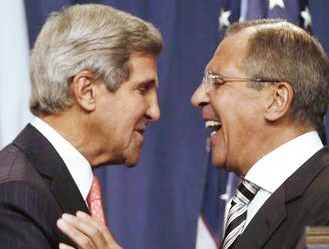Geneva, Sep 14: U.S. Secretary of State John Kerry and Russian Foreign Minister Sergey Lavrov reached agreement on Saturday on a framework for Syria to destroy all of its chemical weapons, and said they would seek a U.N. Security Council resolution that could authorize sanctions short of military action if President Bashar Assad's government fails to comply.

The deal announced by the diplomats on the third day of intense negotiations in Geneva includes what Kerry called “a shared assessment” of Syria's weapons stockpile, and a timetable and measures for Syria to comply.
The deal calls for international inspectors to be on the ground in Syria by November and to complete their initial work by the end of that that month. All of Syria's chemical weapons stocks, material and equipment would have to be destroyed or removed by mid-2014.
But the stakes have been especially high in Geneva, because the negotiations between the United States and Russia on securing Syria's chemical weapons also are considered key to breaking the international stalemate that has so far blocked a resumption of peace talks to end the Syrian civil war, now in its third year.
“We have committed to a standard that says, verify and verify,” Mr Kerry told a packed news conference in the Intercontinental Hotel in Geneva, where he has been staying and the negotiations were conducted since Thursday night.
Among the highlights of the agreement is that the U.S. and Russia would agree to work together on a new, binding Security Council resolution that would ensure verification of the agreement to secure and destroy Syria's chemical weapons stocks and remove its capability to produce such weapons.
The resolution would allow for punitive measures for non-compliance, but stop short of military action, if the 16-nation Security Council approves them. The U.S. and Russia are two of the five permanent Security Council members with a veto. The others are Britain, China, and France.
Another major feature of the agreement is that the U.S. and Russia plan to give Syria one week, until Sept. 21, to submit “a comprehensive listing, including names, types and quantities of its chemical weapons agents, types of munitions, and local and form of storage, production, and research and development facilities.”
In addition, the U.S. and Russia have agreed that international inspectors should be on the ground in Syria by November and complete their initial work by the end of the month. They must be given “immediate and unfettered” access to inspect all sites.
Notably, Mr Kerry said they had agreed on grounds under which they might request a Security Council “Chapter 7” resolution at the United Nations, which is a measure that could include military and non-military sanctions.
But Mr Lavrov, who said the agreement was “based on consensus and compromise and professionalism,” indicated there would be limits to using a Chapter 7 resolution, which Russia would almost certainly veto if it specifically authorized a military strike such as what President Barack Obama has threatened.
“Any violations of procedures ... would be looked at by the Security Council and if they are approved, the Security Council would take the required measures, concrete measures,” Mr Lavrov said.
“Nothing is said about the use of force or about any automatic sanctions. All violations should be approved by the Security Council,” he added.
Mr Kerry also said any violations will result in “measures” from the Security Council, while Mr Lavrov said the violations must be sent to the Security Council from the board of the chemical weapons convention before sanctions short of the use of force would be considered.
Mr Kerry said the pair and their teams of experts had come to agreement on the exact size of Syria's weapons stockpile, which had been a sticking point before their meetings in Geneva. But in marathon sessions into early morning hours, the U.S. and Russia succeeded in narrowing their differences.
The agreement over the Russian proposal to inventory, isolate and eventually destroy Syria's chemical weapons stocks comes as the Obama administration warned that there is a timetable for a diplomatic resolution of the weapons issue.
DPA adds
Meanwhile, the rebel Free Syrian Army (FSA) has rejected a U.S.-Russian deal on dismantling Syria's chemical weapons and has vowed to continue fighting to oust President Bashar al-Assad.




Comments
Add new comment